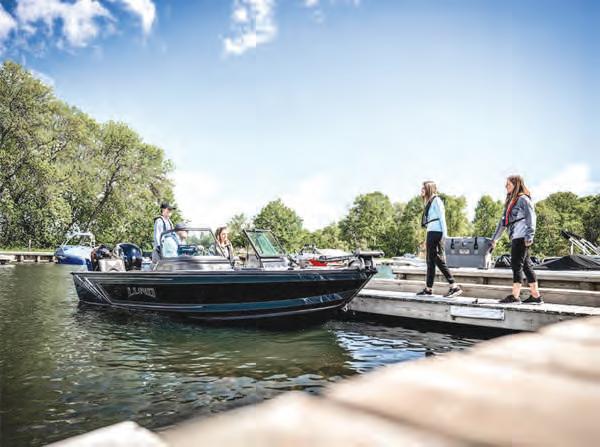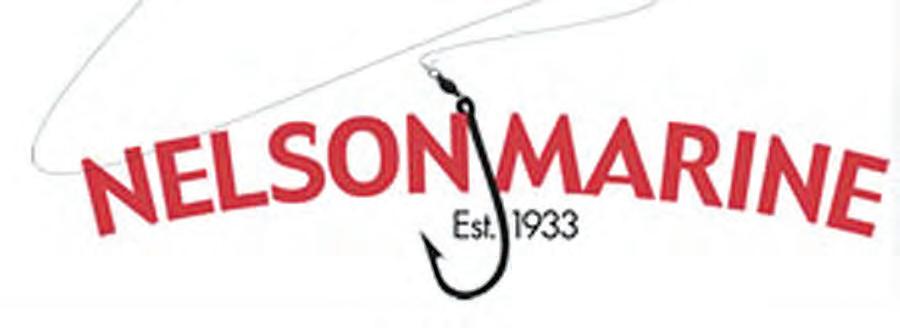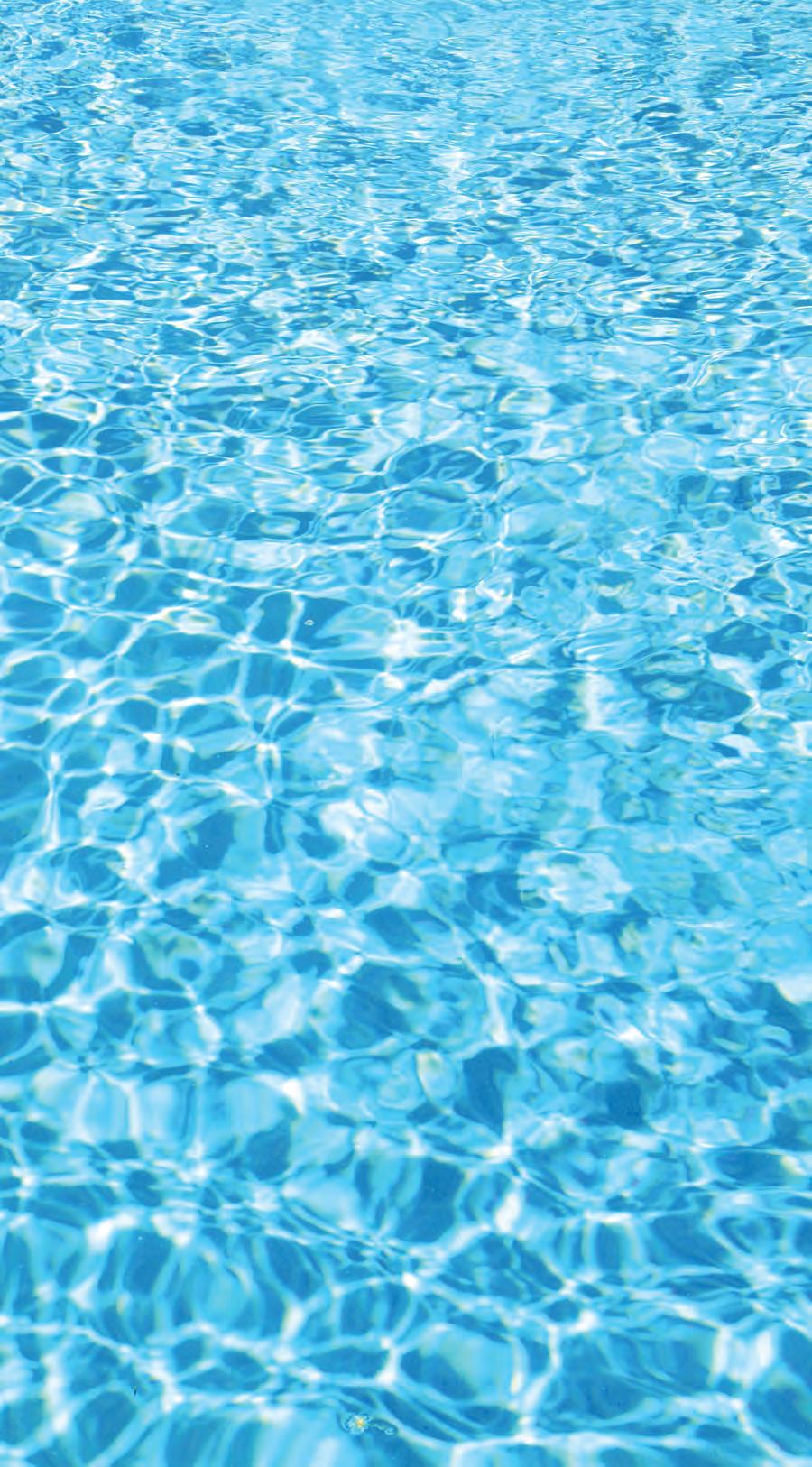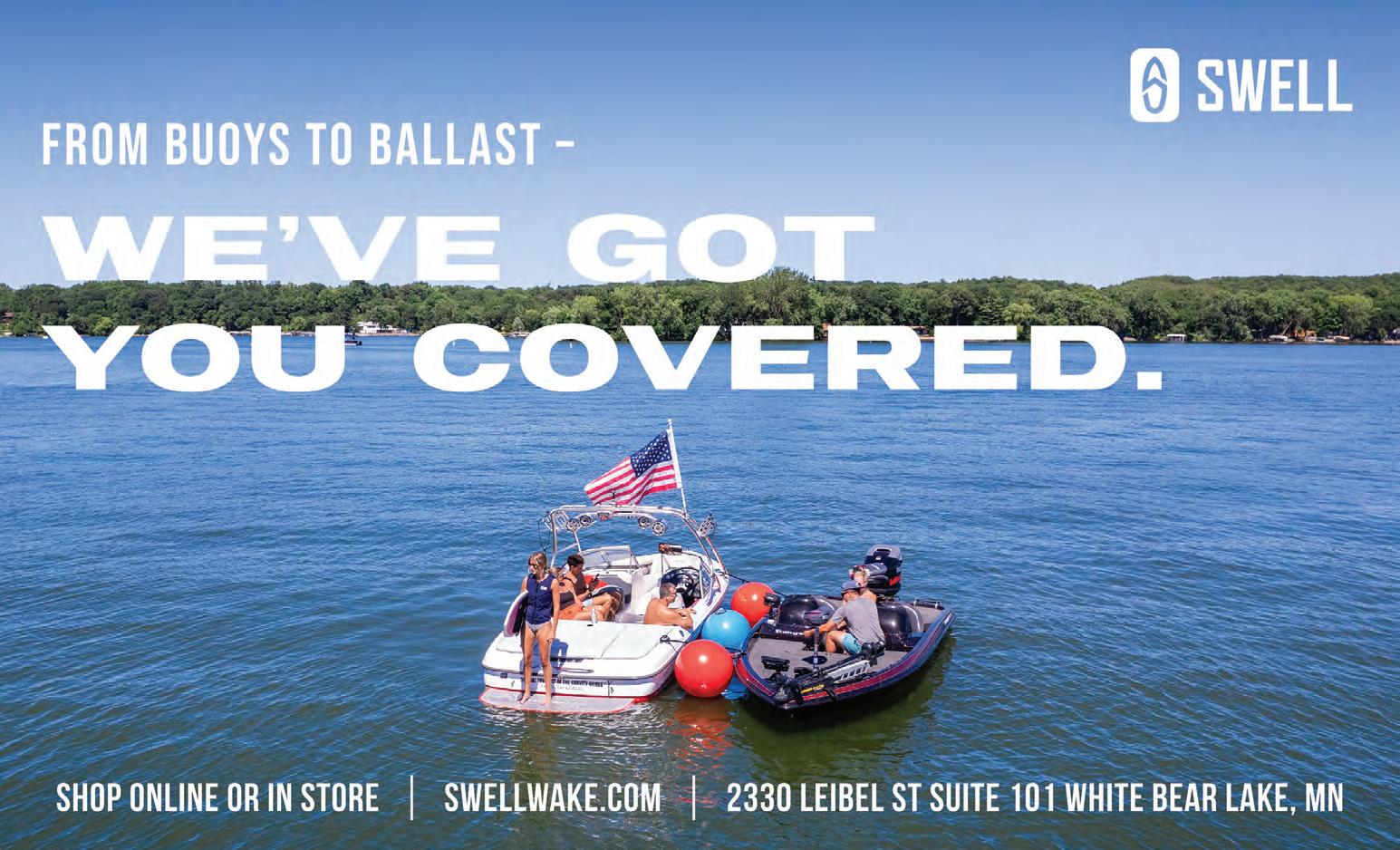





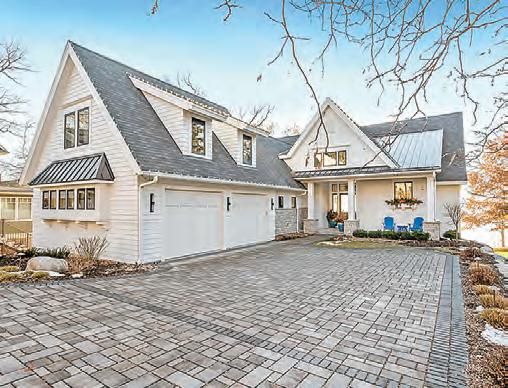

• Maximized our seller’s equity with a strategic, off-market sale
• Timed perfectly to fit our client’s move
• Limited showings—less stress, more convenience
Let’s talk about how our Private Collection can work for you. Our local expertise means better strategy, stronger connections, and exceptional results.
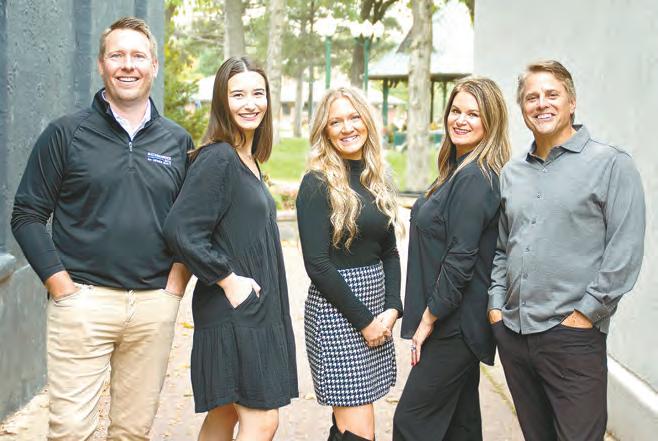
Curious about your home's current value? Call Marty at 651-485-1555 for a complimentary Home Valuation Consultation.


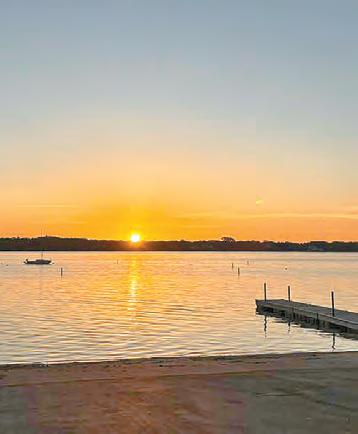

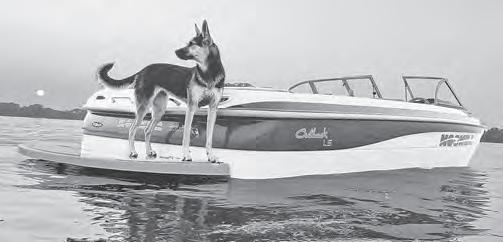

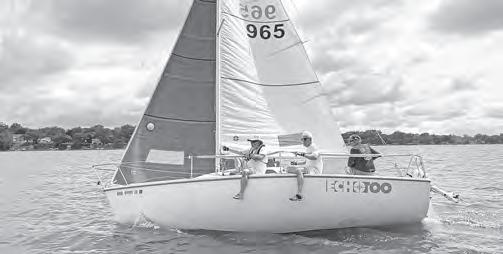
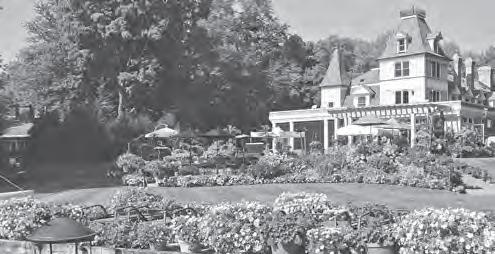
Ah, summer. A sure sign of summer is watching the last few docks go into the water. Another sign is seeing the first issue of the LAKER arrive in mailboxes.
The LAKER launched in 2023, delivered to White Bear lakeshore homeowners, deeded access residents, dock association members and dozens of lake area newsstands. In 2024, delivery expanded to include Bald Eagle Lake homeowners, thanks to the Bald Eagle Area Association board of directors.
To kick things off for 2025, readers who like unique boats will enjoy Erik Suchy’s article about Joel Lemanski and his 1928 Chris-Craft Cadet, which we hope will be on display at the White Bear Lake Boat Show Saturday, June 21.
Fish enthusiasts can learn more about the types of fish that are stocked in White Bear Lake thanks to the Minnesota Department of Natural Resources.
Patrons can learn more about the White Bear Lake VFW remodel, or check out a new recipe like chicken teriyaki and the Strawberry Wave. If you plan to watch sailboat races, spectator etiquette is also inside. Keep a wide berth around racing sailboats.
Dog lovers will be happy to find a new column, the Laker Dog, an exclusive to The Laker inspired by the "Real Dogs of White Bear Lake" in the White Bear Press. This issue’s column features Libby, a dog of Bald Eagle Lake who is 40% husky, 40% German shepherd and 20% “secret sauce.” And you don’t want to miss the giant inflatable hotdog that roams Bald Eagle.
Readers can catch a glimpse inside the affectionately named “Solheim,” or “House of the Sun” in Norwegian, a well-known 19th century mansion on Bald Eagle Lake. History buffs will also learn about the history of Manitou Island. Learn more about the White Bear Lake Conservation District’s accomplishments, 2025 buoy placement, aquatic invasive species work and more.
Looking for something to do? Make sure to check out the LAKER calendar.
Before you dock your reading glasses, make sure to let us know what you think about the LAKER. Be sure to send your lake photos from White Bear Lake and Bald Eagle Lake to ppinfo@ presspubs.com for possible inclusion in an upcoming edition. From our crew to yours, we hope you agree the newest summer essential is the LAKER.



By Logan Gion Contributing Writer
Nearly everyone in the White Bear Lake area is familiar with some form of the Manitou Island legend. Multiple versions of the story, however, muddy the waters regarding what the original Dakota tribe lore surrounding the manitou actually was.
The history of Manitou Island also has multiple conflicting narratives. The island stokes endless curiosity because it paradoxically is at the center of White Bear Lake, both in name and location, yet is accessible only to those who own a home there.
“[Manitou Island] was really the sugar camp for the Dakota. The maple trees out there,” White Bear Lake Area Historical Executive Director Sara Hanson revealed. Some of those same maples, as well as their descendants, are still there today. Hanson stated that the island could be bought as one large chunk of land until the 1880s, when the Manitou Island Land and Improvement Company, the landowners at

the time, began subdividing the land and selling it off.
While that explains how a private neighborhood was built there, rumors swirl around the island, no matter the era. Who has lived in those homes—Gangsters?
Action movie stars? Musicians obsessed with purple?
“In my era, the answers were always Bruce Willis,” laughed Hanson. While the “Die Hard” movie star never lived on Manitou Island, Hanson said that he sometimes visited town to play music with
friends at Bobbie’s in the Park before that restaurant closed in 1988. Hanson clarified that past residents of the island were more notable in the business world. Manitou Island’s houses, however, are historically important in the architecture world.
“Over the years, there have been examples of notable Minnesota architects like Cass Gilbert and Edwin Lundie … who did some fascinating cottages, and then more significant homes,” Hanson explained.
Most importantly, the program will
By Ricka McNaughton Contributing Writer
As lake-worthiness goes, this model’s got all the right specs. She’s a sleek-bodied, reliably high performer built for all-out fun on the water. She’s got all the explosive power yet ease of handling you could want, plus a few next-level features. But, “she” is not a boat. She’s Libby, a dog of Bald Eagle Lake whose DNA wasn’t exactly predictive of the water-loving life. She’s 40% Husky, 40% German Shepherd and what we’ll call 20% Secret Sauce, which is where her water-loving genes must have been floating around. But as a puppy, the odds against Libby having any sort of life at all were steep.
Libby was one of a litter of eight found struggling to survive in the wild, somewhere in Kentucky. Not all of her siblings made it. Those that lived came into an adoption pipeline tracking north. Libby found her forever home with Ben and Maryjane Williams on the shore of Bald Eagle Lake where she now has a nice ski boat, a pontoon, a devoted pair of high-energy humans with a zeal for outdoor action that matches her own, plus a whole community of water-loving friends.
Always ecstatic to head out on the boat, Libby, as “deck officer,” will first stand alertly, nose to the air, taking important readings. When that job’s done, she’ll find a place to settle down nicely. Until, that

is, she gives her humans a look that says: Isn’t it about time for a dip? The only thing Libby lacks as a swimmer is knowing when to quit.

delve into the Manitou Island legend itself. The Mark Twain version says the manitou was a ravenous white bear who kidnapped a chief’s daughter. Another version warns young hunters not to stalk bears by themselves but in a group. Yet another form claims the manitou was not an antagonist at all, merely a guardian enforcing a border. While Hanson’s program will trace the versions as far back as documents go, no one can say when the story of the manitou came into being. That is what makes it legend. ◼
Although both her humans have busy work lives, Libby is almost never without someone who’s delighted to take her for as long as may be needed, or even when not needed. Her one vice? It’s her great pleasure to happen across a dead fish on shore and roll on it. And then roll some more. She’ll return proudly bearing the stink of decay as though she’s found you a fresh bouquet of roses.
Ben admits that, when they first got Libby, they kept their expectations in check. It just wouldn’t be fair to compare her to her predecessor Lucky, who had died three months earlier. A mixed breed, Lucky had been trained by Ben as a seizure alert dog for a family member with epilepsy and she performed heroically. But with her love of the water and vast collection of area friendships, her passing was a blow to many. Such was his love that Ben even has a tattoo of Lucky. And there’s a bronze plaque honoring her in a disc golf course they frequented that features a lovely sentiment from the people who cherished her. (Never mind what the plaque says. It will make you cry.) But in the emo-metrics of love, know that young Libby’s ranking, in the hearts of her humans, now stands right beside Lucky’s. And her tattoo is coming.
Ricka McNaughton is a writer living in White Bear Lake. In each issue of The Laker, readers will find a story featuring a lake or boat dog from White Bear Lake or Bald Eagle Lake. ◼

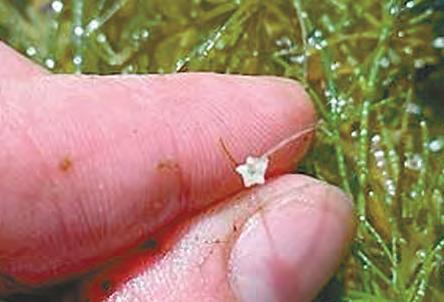
Protect the Lake We Love: Check, Snap, Send and Clean: We all play a part in keeping WBL healthy and beautiful for generations to come.
In the summer of 2024, 1.3% of
the boats launched into WBL while inspectors were present came from a lake infested with SSW. But it takes only one improperly cleaned boat or trailer coming from an infested lake to infest our lake.

What is Starry Stonewort?
SSW is an aggressive, non-native macro algae that:
• Forms dense, thick mats that can smother native plants and clog boat motors
• Outcompetes habitat for native weeds and wildlife
• Spread rapidly by fragments and bulbils (very small star shaped fragments)
What to look for around your dock:
• Bright green (almost fluorescent), stringy algae that has little star shaped bulbs
• Grows in shallow water (2-5 feet), often around docks and lifts
• Feels crunchy or coarse when pulled out of the water
Lakes in MN with SSW: Beltrami, Bemidji, Blackduck, Bowen, Carnelian, Cass, Clearwater, Dora, Grand, Koronis, Leech, Long (Kandiyohi County), Long (Hubbard County), Medicine, Middle

How to help - Your role is critical: Check, Snap, Send. Please check the area around your dock regularly.
• Check the water around your dock, lift and swimming area for SSW
• Snap a photo if you find something suspicious
• Send it by email to the White Bear Lake Conservation District wblcd@msn.com
Cullen, Minnewaska, Mississippi River, Moose, North Twin, Pimushe, Pleasant, Pokegama, Rice, Rush, Thunder, Turtle, Turtle River Lake, Upper Red, West Sylvia, Winnibigoshish and Big Wolf.

Prevent accidently introducing SSW into WBL: Clean-In, Clean-Out for boats, docks and lifts
• Remove all visible plants, algae, mud and debris
• Drain water from bilges, motor, live wells and bait containers and remove plugs
• Dry everything for at least 5 days before launching in White Bear Lake
• Dispose of all bait
• Inspect and clean docks, rafts, and boat lifts if you are moving from another lake and wait 21 days to install into White Bear Lake






The WBLCD places navigational buoys in several places around the lake as shown on this map.
The map shows approximate locations of our navigational buoys; they may change as the water level goes up and down in the lake. There are white shallow water buoys marked with a diamond, and white “no wake’ buoys marked with a circle.
These types of buoys conform to standards set by the Minnesota DNR (see above diagram).
We also place spherical red and green marker buoys in Matoska Marsh to mark the main route through the marsh, directing boats to stay between the red markers on one side, and green markers on the other.
Beyond what WBLCD places in the lake, there are also 'no wake' buoys and navigational buoys placed by the counties and municipalities to keep boats out of swimming areas.

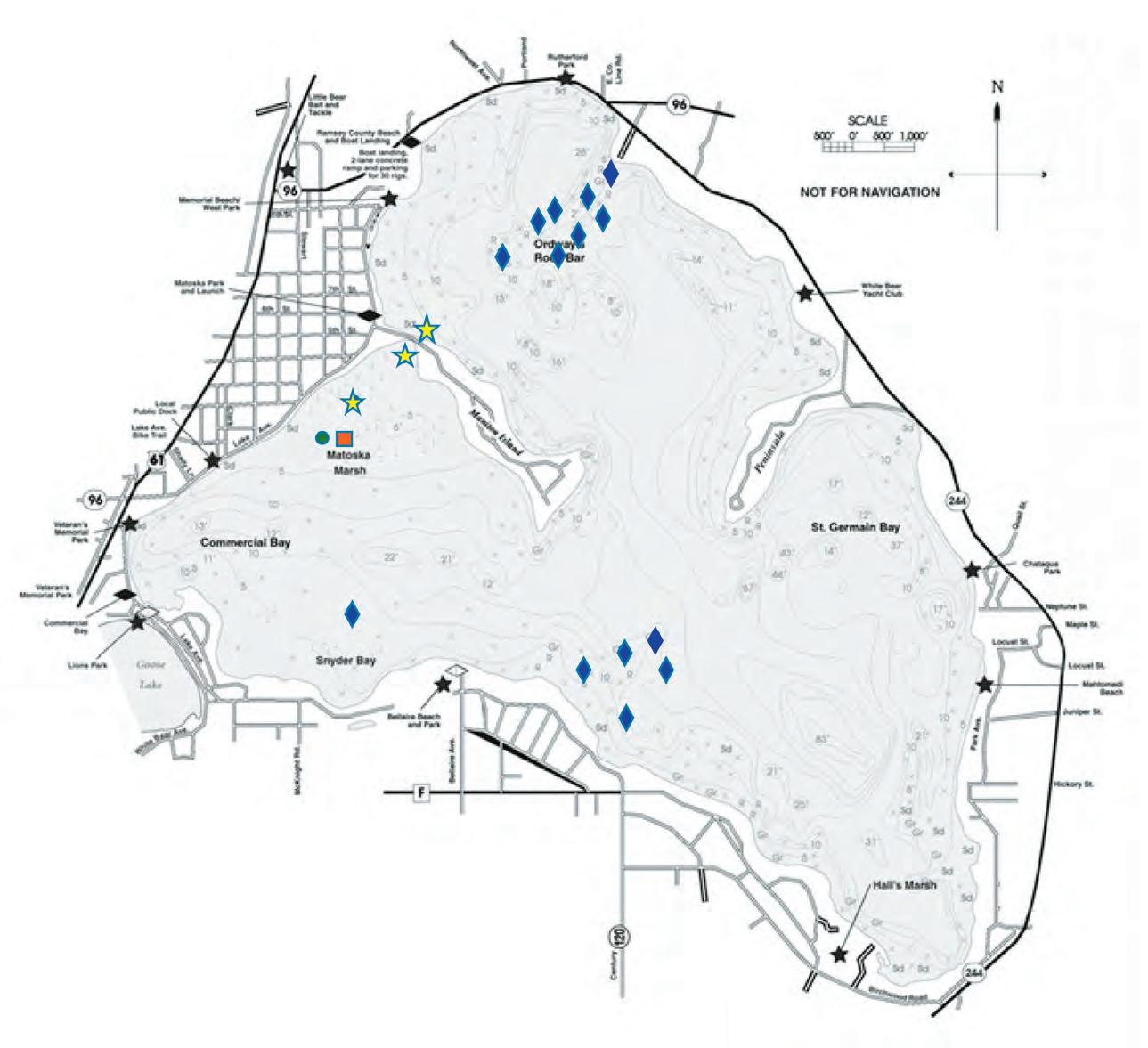
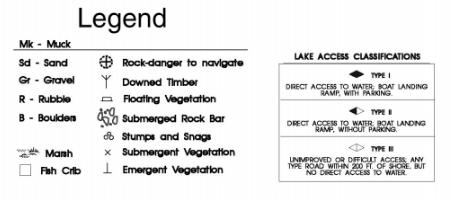

Buoys in place from May 1 – Oct. 15 by the WBLCD Board April 15, 2025 This map is subject to change depending on water levels. Please visit www.wblcd.org for updates.






• Began development of an action plan for the prevention and early detection of Starry Stonewort (SSW)
• Conducted an initial search for SSW at public launches, and no new species were found
• Contracted services to survey, assess and treat Eurasian watermilfoil (EMW) and invasive phragmites
• Contracted services to conduct a lake use study to be finalized in 2025
• Established a study group to address potential low water level issues
• Placed and monitored buoys on the lake; purchased additional buoys
• Granted the Ramsey County Sheriff’s Office (RCSO) with supplemental law enforcement funding which resulted in 89 boat safety checks, 40 personal watercraft (PWC) safety checks, 16 assists, three (3) written citations, 23 written warnings, three (3) verbal warnings, and seven (7) tows
• Collaborated with the DNR conservation officer to provide enforcement of safety concerns on the lake
• Reimbursed municipalities for swimmer’s itch treatment
• Sponsored the annual winter lake
cleanup with Mahtomedi Boy Scout Troop 89 and a summer lake cleanup as a Manitou Days event
• Participated in the DNR’s North and East Groundwater Management Area meeting
• Collaborated with VFW Post 1782 to complete and submit an Environmental Assessment Worksheet (EAW) for a proposed marina expansion; held a public hearing to gather comments on the EAW; and approved a negative
declaration for an Environmental Impact Statement (EIS)
• Created a document for DNR aeration permit holders to complete as part of the WBLCD’s responsibility to regulate the construction and use of aeration devices on White Bear Lake.
• Collaborated with the DNR to manage permits with commercial marinas
• Processed, managed, and approved permit applications for six commercial marinas, 16 noncommercial single- and multiuser dock users, and six (6) events
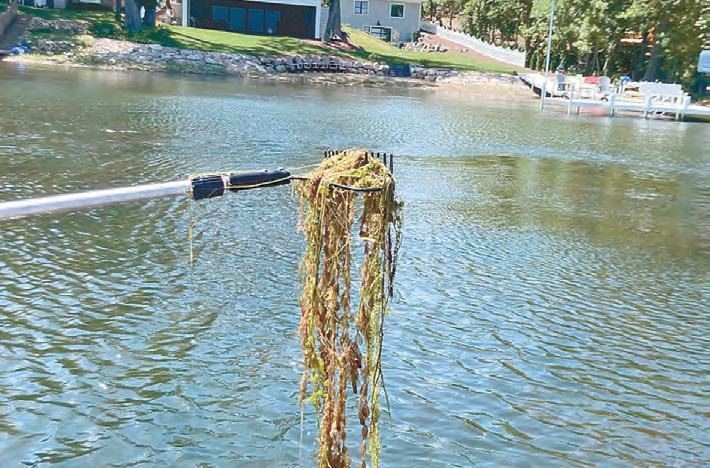

and lake use activities
• Created a WBLCD permit terminology sheet to define terms for permit applicants.
• Created and installed a ‘St. Germain Bay’ sign on the east side of the lake honoring the late George St. Germain.
• Monitored and reported monthly lake level and water temperature, when available.
• Provided lake users, areas residents and lakeshore property owners with WBLCD information, lake use regulations, water safety topics, and low water and conservation measures through the White Bear Press quarterly publication, The Laker, WBLCD website, Facebook, and Instagram
• Follow us on Facebook, Instagram or check out our website
• Website: wblcd.org
• Facebook: “WBLCD” www.facebook. com/WhiteBearLakeConservationDistrict
• Instagram: “WBL Conservation District”
• Phone: (651) 429-8520
• Email: wblcd@msn.org

The 2025 late winter lake cleanup was completed by March 15. A total of 92 participants (37 youth and 55 adults) took part in a land-based cleanup. Despite the weather that delayed the event by a week (warm temperatures that made an on-ice cleanup impossible and then ten inches of snow that covered the trash), volunteers were able to collect an estimated 801 pounds of trash. Over the years (for the 15 years
for which records were kept), this event included 1,630 volunteers and the removal of an estimated 8,084 pounds of trash.
The 2026 late winter cleanup event is scheduled for Saturday, March 7, 2026 – weather permitting.
The 2025 summer lake cleanup is scheduled for Saturday, July 28, as an official Manitou Days event. We ask all lakeshore property owners to clean up their property on or before this date, and we will be

organizing volunteers to clean up public property.
In addition, we are hoping for a flotilla of canoes, kayaks and rowboats to
scoop up trash with nets in shallow areas near the shore. Check WBLCD.org for details!
The WBLCD recently tightened its rules prohibiting pumping water out of the lake for use on land. Ordinance 6 used to make this prohibition dependent on the water level, but that dependency has been removed. It now says, “No person may
pump or otherwise mechanically appropriate water from White Bear Lake at any time.”
1. Check your dock area for Starry Stonewort regularly
2. Join us for the Manitou Day Summer Lake Clean Up on June 28th
3. Stay up to date: follow us on social media
4. Have a safe summer on WBL!
The White Bear Lake Conservation District (WBLCD) was formed by the State of Minnesota in 1971 as a special district governmental unit to take care of the body of water known as White Bear Lake. The Act authorized the WBLCD to make rules and regulations regarding the lake as it collaborates with other agencies. The WBLCD is governed by a 10-member volunteer Board of Directors made up of two representatives appointed by the City Councils of White Bear Lake, White Bear Township, Dellwood, Mahtomedi, and Birchwood.

Watch your wake: you are responsible for any damage created by your wake
Turn it down: Lake water cools the air over the lake causing sound to travel further
Always use your lights from dusk to dawn
Use extra caution around boats towing tubers, water skiers and surfers. Boats and jet skiers must remain 100 ft from other boats especially when jumping wakes
Personal watercraft (PWC) have extra rules:
• they must remain 150 ft from shore unless at idle speed
• you must be older than 12 to drive a PWC even with a parent onboard
• you need a watercraft permit to operate a PWC from ages 12-21
• hours of operation are from 8 am to 8 pm
For people fishing: do not cut your lines and leave them in the lake nor leave lures. This endangers swimmers and wildlife
Boats must stay 100 ft from people in the water and 100 ft from docks and rafts while towing a skier/tuber/etc.
Do not litter - pack out your trash
Respect Wildlife: keep at least 100 feet away from loon nesting platforms and other wildlife

When: 6 p.m. Sundays, beginning June 8
Where: Little Goose Lake, 4150 Hoffman Road, White Bear Lake
Details: The Ski Otters are celebrating 30 years on Goose Lake. Enjoy a fully scripted, narrated, costumed production of “Otter Time Fitness.” Watch the crazy antics of our water ski fitness gym trying to keep up with technology. Fun for the entire family. Bleacher seating available or feel free to bring a chair.
Contact: skiotter.com/contact
When: 7 p.m. Thursdays, beginning June 19
Where: Trailside Park, 7145 Main St., Centerville
Details: Volunteer waterskier team performs weekly throughout the summer, and travels throughout Minnesota to perform weekend shows. Contact: baldeaglewaterski@gmail. com or 320-438-4121
When: 6-9 p.m. Thursdays, beginning June 19
Where: Downtown White Bear Lake
Details: Community summer festival with over 200 food and vendor booths, live music, car show, kids activities, specials at local merchants. Themes include Manitou Days on June 19 and History Night on June 26. Contact: marketfestwbl.com
When: 8 a.m.-12 p.m. Saturdays, beginning June 28
Where: Veterans Memorial Park
Details: The Mahtomedi Farmers’ Market encourages local growers, nonprofits and artisans to come together and celebrate the community. Local vendors offer fresh produce, honey, artisan breads, handmade crafts and much more.
Contact: mahtomedifarmersmarket@ gmail.com
When: 8 a.m.-12 p.m. Fridays, beginning June 27
Where: Clark Avenue between Second Street and Third Street
Details: A tradition since the 1970s, the

Black Bear Yacht Racing Association
Regular Racing Season
Begins May 27 on White Bear Lake, Mahtomedi Bay.
• Keelboat: 6:30 p.m. Tuesdays
• Keelboat: 12 p.m. Saturdays, May 31, June 14 and June 28
Go to bbyra.com for information and schedule.
Mayhem Regatta
When: 12-3 p.m. Saturday, May 24 and Sunday, May 25
Where: White Bear Lake (Mahtomedi Bay)
Details: Kickoff to the Black Bear Yacht Racing Association racing season.
Contact: bbyra.mn@gmail.com
Go to wbycsail.org for information and schedule
farmers' market features more than 50 vendors—many returning as secondgeneration farmers.
Contact: whitebearlake.org or 651-4298526
When: 6-9 p.m. Wednesdays, Fridays and Saturdays
Where: Tally's Dockside, 4441 Lake Ave. S.
Details: Live music on the lakeside patio. Seating is first come, first serve.
Recommended arrival time is 5 p.m. See full lineup at cghooks.com/summerevent-music-calendar.
Contact: 651-429-2633
When: 9 a.m. Wednesdays and Fridays
Where: Chautauqua Park, 76 Quail St., Mahtomedi
Details: Join Nancy on Wednesdays or Josie on Fridays for a peaceful beach yoga practice that is sure to delight your
summer mornings. Pre-registration is highly recommended at yogadevotion. com.
Contact: lori@yogadevotion.com
When: 10 a.m.-noon Fridays, beginning June 13
Where: Fillebrown House, 4735 Lake Ave., White Bear Lake
Details: Visit our quaint 1879 lakeside cottage—a true example of life during the resort era in White Bear Lake. The Fillebrown family occupied the house for most of its years as a residence and donated the house with its contents to the WBLA Historical Society in 1978. Contact: office@whitebearhistory.org or 651-407-5327
When: 5:30-7:30 p.m. Friday, May 30
Where: Bald Eagle and Otter Lakes Regional Park, 5785 Hugo Road, White Bear Township
Details: Community event with fishing, games, music, food, demos, bike giveaways and other activities. Rain location is at White Bear Lake Area High School, 5045 Division Ave, White Bear Lake.
Contact: communityservices.isd624.org
When: 12-8 p.m. Saturday, May 31
Where: Hello Boba Tea and Treats, 951 Wildwood Road, White Bear Lake
Details: Local artists, vendors, food trucks and a live music performance— Hello Boba aims to bring the community together.
Contact: 651-706-6235
The Sidekicks: Music of the 80's
When: 7:30 p.m. Saturday, June 7
Where: Hanifl Performing Arts Center, 4941 Long Ave., White Bear Lake
Details: Tribute band plays best tunes from the 80's. Ticket information online. Contact: lakeshoreplayers.org or 651478-7427
When: 7-9 p.m. Monday, June 9
Where: The Dugout, 96 Mahtomedi Ave. Details: Grab a guitar, and sing a song or two.
Contact: dugoutbarmn.com/contact
When: 6 a.m.-3:30 p.m. Saturday, June 14
Where: Bald Eagle Lake, 5785 Hugo Road, White Bear Township; White Bear Lake 5050 Lake Ave., White Bear Lake
Details: Cash prizes and Junior division. Participate on 21 Twin Cities Metro-area lakes. Prizes awarded through tenth place. Register by June 13.
Contact: metromuskietournament.com/ contact
When: 8 a.m.-1 p.m. Wednesday, June 14
Where: Community of Grace Lutheran Church, 4000 Linden St., White Bear Lake
Details: A great way to kick off Manitou Days, Community of Grace has hosted the community garage sale for over 20 years. Find amazing deals, sell your wares, or volunteer to make it all happen. Contact: hello@gracepeople.church or 651-429-5349
When: 8 a.m.-1:45 p.m. Friday, June 20
Where: VFW Parking Lot, 4496 Lake Ave. S., White Bear Lake
Details: The American Red Cross continues to experience a severe blood shortage that is negatively affecting blood product availability across the country. Donors of all blood types – especially type O and those giving platelets are needed.
Contact: 1-800-RED-CROSS or redcrossblood.org
When: 6:30 p.m. Friday, June 20
Where: From Second Street and Clark Avenue to at Memorial Beach, White Bear Lake
Details: Gather ‘round for floats, marching bands, local organizations and more as they travel through downtown and along Lake Avenue toward the beach. Contact: parade@manitoudays.com
When: 8-11 p.m. Friday, June 20
Where: Memorial Beach, 4980 Lake Ave., White Bear Lake
Details: Enjoy live music by the Free and Easy Band. Food and beverages available
Regular Season Racing
Begins May 27 on Bald Eagle Lake.
• E Scows: 6:30 p.m. Tuesdays
• Laser Boats: 6:30 p.m. Wednesdays
• Hobie Boats, E Scows: 10 a.m. Saturdays
• Hobie Boats, E Scows: 1 p.m. Sundays
Call Sailing Captain Trevor Taylor at 651-500-3127 for full schedule.
Memorial Day Race
When: 10 a.m. Saturday, May 24, 1 p.m. Sunday, May 25, and 10 a.m. Monday, May 26
Where: Bald Eagle Lake Details: Kickoff to the Bald Eagle Yacht Club racing season. Contact: russell.dedrick@aol.com or 651-303-1891
Father’s Day Pancake Breakfast
When: 9 a.m.-12 p.m. Sunday, June 16
Where: 5500 E. Bald Eagle Blvd., White Bear Township Details: This yacht club yearly tradition is open to the public. Contact: russell.dedrick@aol.com or 651-303-1891
for purchase. All proceeds will fund White Bear Lake Rotary Club community projects.
Contact: info@manitoudays.com
When: 8 a.m.-12 p.m., Saturday, June 21
Where: White Bear Lions Park, 4420 Lake Ave., White Bear Lake; Veterans Memorial Pier, 4520 Highway 61, White Bear Lake
Details: Open house and showing of our little airport on the hill.
Contact: info@sweetlifelane.com or 651705-8600
When: 8:30 a.m. Saturday, June 21
Where: Memorial Beach, 4980 Lake Avenue
Details: Join us at Memorial Beach for the annual fundraiser for the White Bear Lake Area Food Shelf. We will center ourselves into a lovely lake vibe and practice presence in the beauty of nature. RSVP and donation requested. Contact: yogadevo@gmail.com or 651253-1148
When: 9 a.m.-12 p.m., Saturday, June 21
Where: Benson Airport, 5860 Highway 61, White Bear Township
Details: Free fishing contest for children
ages 15 and under. Swag bags, prizes and more for all registered participants. Sponsored by SweetLife Lane. Contact: 651-429-1817
When: 10 a.m.-12 p.m. Saturday, June 21
Where: Memorial Beach, 4980 Lake Ave., White Bear Lake
Details: Gather family and friends to build a sandcastle, sand creature or sand sculpture in a free event hosted by White Bear Center for the Arts. Bring your own shovels, buckets and sand carving tools. Prizes awarded at noon.
Contact: wbca@whitebeararts.org or 651-407-0597
When: 10 a.m. - 3 p.m. Saturday, June 21
Where: White Bear Lake Shopping Center, 4391 Lake Ave. S.
Details: Display of classic and vintage boats—inboards, outboards, row boats and sailboats. Live fishing as well as nautical market.
Contact: ppinfo@presspubs.com or 651407-1200
When: 10 a.m.-3 p.m. Saturday, June 21
Where: Sunrise Park District Service Center, 2399 Cedar Ave., White Bear Lake
Details: Players are given a number and games are assigned by a number chart. We do not record your scores. This is for intermediate and advanced players. Contact: dale@grambush.com or 651357-6109
Birchwood Music in the Park
When: 6 p.m. Sunday, June 22
Where: Tighe-Schmitz Park, 410 Lake Ave., Birchwood
Details: This concert from band Folk Revival is free and open to the public. Seating is not provided, so bring a folding chair or blanket. Beer and wine are permitted. Contact: cityofbirchwood.com
When: 6-7 p.m. Monday, June 23
Where: White Bear Lake Library, 2150 Second St., White Bear Lake
Details: This year’s Manitou Days theme is “Bears Making History.” Come help us celebrate some of our community members who have done just that. Contact: office@whitebearhistory.org or 651-407-5327
When: 5-6 p.m. Tuesday, June 24
Where: Matoska Park, 4810 Lake Ave. N., White Bear Lake
Details: Join the City of White Bear Lake and the White Bear Lake Area Historical Society to unveil a brand new monument in honor of Gerry Spiess’ historic accomplishment–sailing across the Atlantic and Pacific in a 10-foot sailboat. Contact: office@whitebearhistory.org or 651-407-5327
When: 6-8 p.m. Wednesday, June 25
Where: White Bear Lake Armory 2228 Fourth St., White Bear Lake
Details: This tour will highlight the history of the former resorts that lived along our shores. Advance ticket purchase required at whitebearhistory.org/events/guidedwalking-tour-of-lake-avenue. Contact: office@whitebearhistory.org or 651-407-5327
When: 8:30-11 a.m. Friday, June 27
Where: Clark Ave., between Second Street and Third Street
Details: Join us for donuts, coffee, juice and conversations with a cop at the farmers’ market.
Contact: cvarco@whitebearlake.org or (651) 429-8550
When: 8 a.m.-12 p.m. Saturday, June 28
Where: White Bear Lake – water and shoreline
Details: Community members are invited to get out on the lake in a watercraft or walk the shoreline to pick up trash.
Contact: wblcd@msn.com or 651-4298520
When: 10 a.m.-1 p.m. Saturday, June 28
Where: White Bear Lake Armory 2228 Fourth St., White Bear Lake
Details: Grab your friends and family for a fun, lively puzzle competition with a special photo from the White Bear Lake Area Historical Society’s archive. This competition is for teams of four and will feature a 500-piece puzzle. Prizes will be awarded for first, second and third place. All teams get to keep their competition puzzle.
Contact: office@whitebearhistory.org or 651-407-5327
When: 10:00 a.m.-3 p.m. Saturday, June 28
Where: Hippodrome Ice Arena, 4886 Bloom Ave., White Bear Lake Details: Shop over 70 booths of Minnesota's best crafters, artisans, boutiques and vendors. Food trucks on premises.
Contact: sunriseeventsandcraftshows@ gmail.com or 763-269-2166
When: 8-11 a.m. Sunday, June 29
Where: White Bear Lake County Park, 5050 Lake Avenue
Details: Participate in a sprint-level or olympic-level triathlon. Barbecue and awards ceremony at the finish line. Custom finisher medals and free professional photography.
Contact: judi@mmraces.com or 651-4701619
When: 9-11 a.m. Sunday, June 29
Where: West Park, 2350 11th St., White Bear Lake
Details: Join us for our 13th annual 5K fun walk along White Bear Lake. All proceeds go to Cranio Care Bears, a nonprofit that mails care packages to affected children before their surgeries.
Contact: 651-747-3650 or sites.google. com/site/keegans5kforcranioawareness
White Bear Yacht Club Sailing Division
Regular Racing Season
Begins May 28 on White Bear Lake
• A Scows: 6:30 p.m. and 7:30 p.m. Mondays
• C Scows, Catamaran, E Scows, MC Scows: 6:30 p.m. Wednesdays
• Melges 15 Boat: 6:30 p.m., 7 p.m. and 7:30 p.m. Thursdays
• C Scows, E Scows, MC Scows, X Boats: 10 a.m. and 11 a.m. Saturdays
• Catamaran, E Scows: 1 p.m. and 2 p.m. Saturdays
• Melges 15 Boat: 2 p.m., 2:15 p.m., 2:30 p.m., 2:45 p.m. Sundays
• Laser Boats: 2 p.m., 2:15 p.m., 2:30 p.m., 2:45 p.m. Sundays
Go to wbycsail.org for information and schedule.
When: 11:30 a.m.-1 p.m. Sunday, June 29
Where: St. John in the Wilderness Episcopal Church, 2175 First St., White Bear Lake
Details: A parade of creatures great and small followed by blessings given to all. Pet-friendly outdoor worship service at 10 a.m. Refreshments provided for humans. Contact: 612-221-1614 or communications@stjohnwilderness.org
Pet and People Appreciation
When: 4 p.m. Saturday, June 28
Where: St. Stephen Lutheran Church, 1965 E. County Road E, White Bear Lake
Details: Join us for a celebration of our furry friends and their caregivers. Explore activities and resources for pet lovers, discover local animal services and meet rescue organizations. Contact: 651-777-1107




Vol. 3 • No. 1
by Debra Neutkens Contributing Writer
Affectionately named “Solheim,” or “House of the Sun” in Norwegian, a well-known 19th century mansion on Bald Eagle Lake is described by its owners as a two-story Victorian on three sides and a lake home on the other.
The home was built in 1897 by Engebreth Hagbart Hobe, a 37-yearold lumber baron who served in the Norwegian consulate for 49 years. His duties included transacting commercial negotiations between Norwegian and American businesses and dealing with citizenship matters.
Like a vast number of Norwegians, Hobe immigrated to Minnesota in 1883. With a partner, he established the E.H. Hobe Lumber Company in St. Paul, which obtained timber from the virgin forests of northern Wisconsin. They also operated a real estate and steamship ticket business.
Hobe married a Danish woman

named Johanne Moller in Copenhagen a decade before building the mansion.
The couple lived at Solheim until 1917 when they moved to Dayton Avenue in St. Paul, but maintained the lake


home for summer use. They had one daughter, Ragnhild.
Scandinavian royalty and delegations stayed at Solheim while visiting the Twin Cities. Norway’s Crown Prince Olav and Princess Martha famously paid a visit in 1939 to decorate Consul Hobe with the Star of the Royal Order of St. Olaf on behalf of Norway’s sovereign.
Hobe died a year later at age 80. After his death, his heirs formed the Solheim Corporation to oversee his vast estate, according to online historical records, selling some of the lakeshore property and donating land to Ramsey County for use as a nature preserve. Hobe’s descendants sold Solheim in 1957.
Though it has undergone several iterations over its long history, the 6,000-square-foot Victorian features 18 rooms, four fireplaces, beveled and leaded glass, heavy oak doors, 10-foot ceilings, porches and a fourstory tower; all on a thick limestone foundation. Much of the handcrafted woodwork, including wainscotting, ceilings and stairway, remains original. The pieces were made in Norway,
numbered and shipped for reassembly to the mansion.
Its current proprietors, John and Barb Cretzmeyer, continue the tradition of hosting in the elegant home. They love to entertain anywhere from 12 to 200 guests, holding themed parties, fundraisers for favorite charities like the Children’s Hospital, large family dinners and their annual Not-theFourth-of-July lakeside bash that serves up about 500 margaritas.
John, a semi-retired dentist, and Barb, employed in her family’s orchard business, bought the property in 1981. John happened to be riding his bike along the lake when he saw a “For Sale” sign. “It was the last kind of house I thought we were going to get,” he recalled.
They’ve renovated both the interior and exterior over the years, replacing windows, moving the main entrance and installing patios and a pool where once was a wraparound porch. The HVAC system was updated with in-floor heat and forced air, which meant retiring radiators that required
CONTINUED ON PAGE 2B
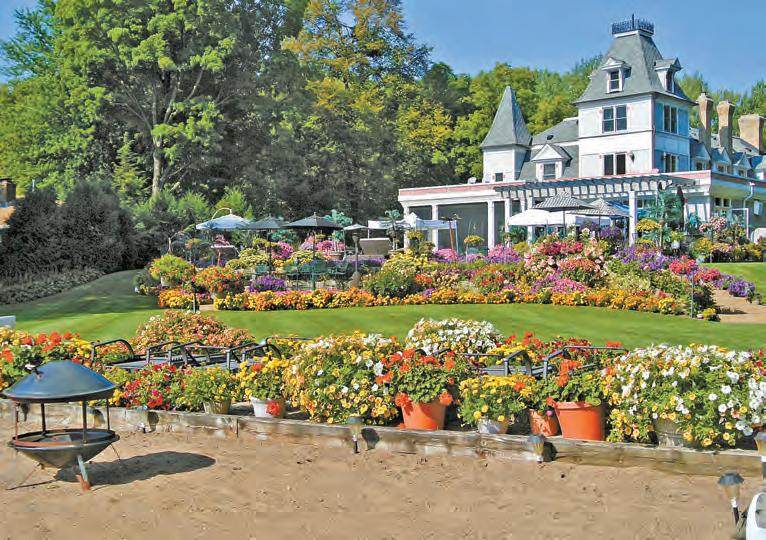
shoveling coal. Trees obstructing the lake view were also removed.
Old newspapers dating from the 1800s were discovered in the walls during reconstruction, commonly used for insulation. And there were letters. “We’d come home and the construction guys would be chuckling about letters found in the walls, salacious content of which we can’t divulge in case some of the descendants may still be around,” John said. “Let’s just say it was between two people who weren’t married.”
According to the Cretzmeyers, Hobe had enough clout with the governor to move a road that ran along the lake to what is now W. Bald Eagle Boulevard. “That is why properties on this side have the road behind us,” Barb noted.
Added John, “On Sundays, musicians would play chamber music on a mound in front of the house for passing carriages.”
Many people know the mansion as the couple have been featured in the paper before for their extravagant holiday displays. As reported in 2018,

John decided the year would be their grand finale and after the holidays, he gave the remarkable sum of 300,000 lights away to a church. “And then he had to buy some more,” Barb chided. John quickly added, “I’m holiday lights, she’s plants.”
So what do they love most about the house? “The views of the lake and all the places we can sit,” John replied. “It takes at least one bottle of wine to sit in all the venues. We move from spot to spot. From the end of the dock to chairs on the rock wall, to one of the


day beds by the pool. At the end we go up on the roof because we have chairs there, too. That might be a two-bottle circuit.”
Fake palm trees add to the tropics ambience they love, too, John added. “It’s our paradise and we have a lot of fun. It’s a party house. We hope to stay here forever.” ◼
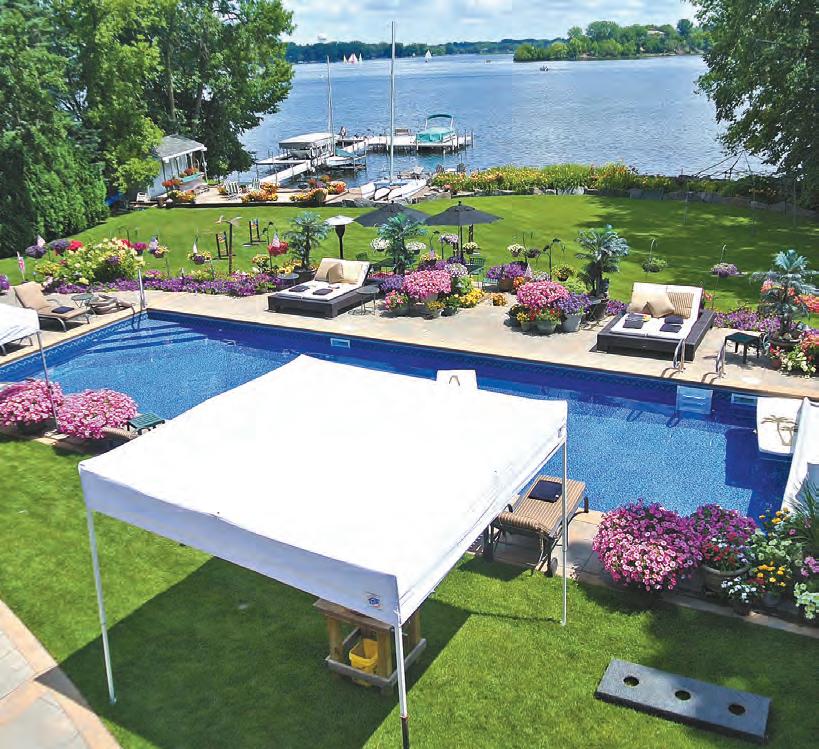
Makes: 6 servings
Ingredients
Cocktail Batch
7.5 oz Vanilla vodka
4.5 oz Coconut vodka
4.5 oz Kahlua Golden Roast
2.5 oz Crème de Cacao
1.5 oz Cold Brew
Concentrate
3 oz Licor 43
For each cocktail
5 drops Fee Foam
4 drops Sesame oil
3 Espresso beans (for garnish)
Instructions
1. Prepare the Cocktail Mix:
In a shaker, pour 4 ounces of the combined mix of vanilla vodka, coconut vodka, Kahlua Golden
Roast, crème de cacao, cold brew concentrate, and Licor 43 over ice. Stir gently for 30 seconds.
2. Strain the Mixture: Strain the chilled mixture into a separate chilled shaker without ice.
3. Add Fee Foam: Add 5 drops of Fee Foam to the shaker. Shake vigorously until well combined.
4. Prepare the Coupe Glass: In a coupe glass, add sesame oil.
5. Serve: Strain the cocktail into the prepared coupe glass. Garnish with three espresso beans.
Enjoy your MIZU Midnight in Tokyo!


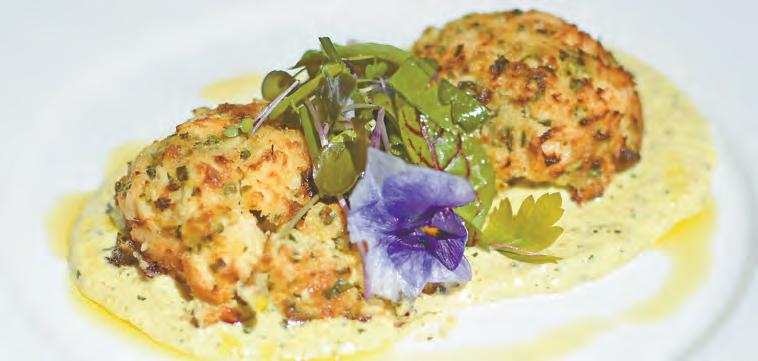
Ingredients
For the Crab Cakes:
6 cans jumbo lump crab
1 lb gluten-free bread (toasted and small diced)
3 cups celery (small dice)
2 cups chopped parsley
2 cups chopped chives
8 eggs
1 ½ cups mayonnaise
2 tablespoons Old Bay seasoning
2 tablespoons green Tabasco
1 tablespoon lemon juice
Salt and pepper (to taste)
For the Remoulade:
1 quart drained cornichons
4 shallots (peeled and rough chopped)
2 tablespoons Dijon mustard
2 teaspoons salt
2 teaspoons pepper
1 cup egg yolk
4 cups canola oil
½ cup sugar
Zest and juice of 3 lemons
½ teaspoon Aleppo pepper
1 cup chopped parsley
For the Herb Salad:
Fresh chives
Fresh parsley
Fresh chervil
Fresh microgreens
Edible flowers
Lemon juice
Salt and pepper
Instructions
Prepare the Crab Cakes:
1. In a large bowl, combine the diced gluten-free bread, celery, chopped parsley, chopped chives, eggs, mayonnaise, Old Bay seasoning, green Tabasco, lemon juice, salt, and pepper. Mix well until everything is fully incorporated.
2. Gently fold in the jumbo lump crab and the roasted gluten-free bread until just combined. Be careful not to break up the crab meat.
3. Form the mixture into patties.
Prepare the Remoulade:
1. In a blender, add the drained cornichons, rough chopped shallots, Dijon mustard, salt, and pepper. Blend until finely chopped.
2. Add the egg yolk and emulsify for 2 minutes, slowly adding the canola oil in a steady stream until thickened.
3. Once thick, add the lemon zest, lemon juice, and sugar. Blend thoroughly.
4. Finally, add the Aleppo pepper and chopped parsley, and blend for an additional minute.
Prepare the Herb Salad:
1. In a bowl, gently combine fresh chives, parsley, chervil, microgreens, and edible flowers.
2. Drizzle with lemon juice and season with salt and pepper. Mix gently.
Cook the Crab Cakes:
1. Preheat your oven to 450°F (232°C).
2. Brush the crab cakes with clarified butter and bake for 6 minutes or until golden brown.
Serving:
Serve the crab cakes with a generous amount of citrus remoulade underneath and garnish with the fresh herb salad.
Enjoy your delicious ACQUA Blue Crab Cakes with Citrus Remoulade!











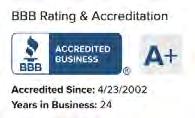
By Jackie Bussjaeger Contributing Writer
Spring is in full swing. Birds are nesting and singing on their territories, and the landscape is transforming into a vibrant wonderland of life and sound. It is truly a breath of fresh air after the frozen quiet of winter.
Hundreds of bird species nest in Minnesota during May and June, all of them highly specialized to the specific habitats found here. Knowing the habitat preferences of these nesting species is sometimes enough to help with identification: for instance, a sparrow in a wide open prairie is more likely to be a Field Sparrow, and less likely to be a forest-dwelling species such as a White-throated Sparrow.
As these birds build nests and settle into their summer homes, they nudge us to look more deeply at the landscape around us. These are just a few of the birds that can be found in nesting in different kinds of Minnesota habitats this spring.
Forests
Oaks and cottonwoods that have been leafless all winter are now alive with showy orioles and quick-darting warblers. Many of the species that will nest in Minnesota in the coming weeks have traveled thousands of miles from the tropics of Central and South America. Some people enjoy attracting orioles to their yards with offerings of grape jelly and orange slices. Nectar-producing shrubs such as raspberries and crabapples can also draw orioles and hummingbirds, as well as a wide variety of pollinating insects, to your yard.
The treetops are alive with the frenzied activity of dozens of warbler species. Some will remain in our forests through the summer, while others are simply stopping by on the way to nesting grounds further north. The variety and splendid colors of these small, energetic birds are highly rewarding for anyone with the patience to sit a while with binoculars pointed up toward the trees. Some of the easier-to-spot species that will stick around to nest include Yellow-rumped Warblers, Yellow Warblers, and Common Yellowthroats.
Some species that once were at home on the open plains and prairies have adapted their lifestyles to suit farm fields and clearings. Eastern Kingbirds bring a formal flashiness to old fence lines and hedges with their stark black-and-white plumage. Grassy fields and farmland are also the areas to look for Eastern Bluebirds, Field Sparrows, Ring-necked Pheasants and American Kestrels. Killdeer are an adaptable shorebird that can be found in a variety of habitats, often choosing open areas or places near bodies of water, or even puddles. They tolerate human presence well, and attend to their nest diligently, drawing predators away with a “broken wing” distraction display. When the eggs hatch, Killdeer chicks are almost immediately as mobile as their parents, making quick getaways on tiny, fast legs.
The first fluffy goslings are now bobbing along behind their parents. Every treetop and cattail near the water is

Yellow Warblers are one of the most common and recognizable warblers found in Minnesota during the summer. They will build their nests in thickets and shrubs, especially near water.
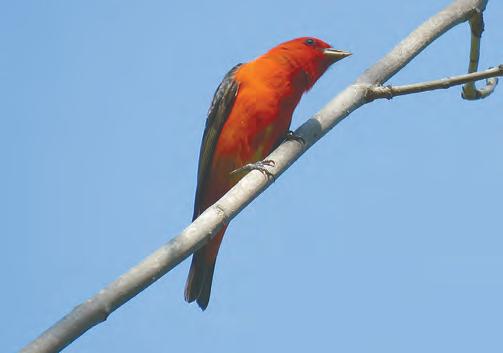
Adult male tanagers are bright red with black wings, while females and juveniles appear yellow in color. They can be found near the canopy of shady forest areas and spend their winters in the tropical rainforests of South America.
defended ferociously by a Red-winged Blackbird. Look closer, and you’ll see some of the more secretive wetland nesters, such a Green-winged Teal. These small ducks are well camouflaged and can be difficult to spot as they feed along the edges of vegetation on ponds and lakes. The females are brown and mottled to hide them while they sit on the nest, while males display an eye-catching greenstriped head and neatly dotted breast. Both sexes show an iridescent green patch on their wing feathers, which gives them their name.
Perhaps one of the most elegant birds of the wetlands, Great Blue Herons are now back in abundance. They will build nests high in the trees out of loosely woven sticks. It is common to see large colonies called rookeries along lakes and rivers, where the water adds extra protection from predators.
Snags are dead, standing trees that provide an abundance of resources to nesting birds. They are often infested with insect colonies, which provide the majority

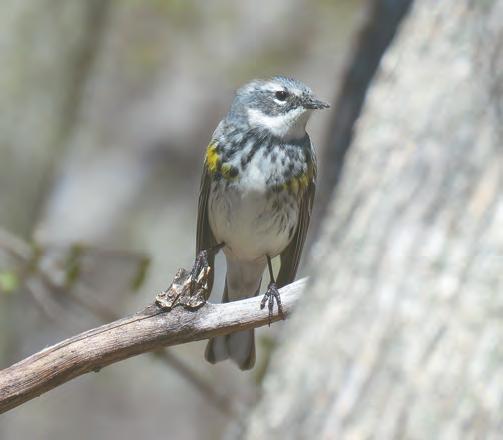
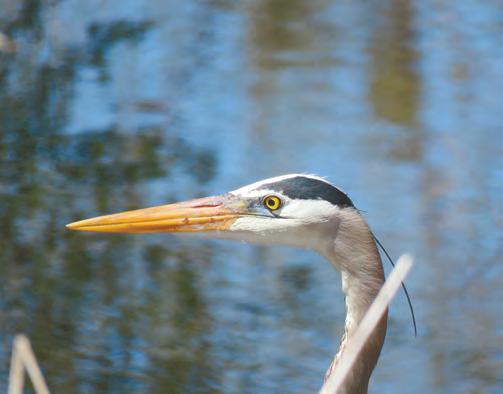
of the diet of many woodpecker species. Woodpeckers will also drill holes into snags to use as nest cavities, and abandoned woodpecker holes also become habitat for other species that can’t drill holes, such as Wood Ducks, Eastern Bluebirds, and Black-capped Chickadees. A closer look at areas with snags can even reveal wellcamouflaged Eastern Screech Owls, whose faces may be visible in the protection of tree cavities as they sleep through the daytime hours.
Hear a loud hammering sound in the forest? Northern Flickers and Yellow-bellied Sapsuckers will often seek out the most resonant dead, hollow trees to create the loudest sound, drumming to ward of rivals and get the attention of potential mates.
In addition to being rich in biodiverse wetlands, Minnesota also boasts a lot of lakeshore habitat. Sandy or rocky shorelines often provide the right conditions for nesting sandpipers. In areas along Lake Superior, shorelines are critical habitat for federally endangered species such as the Piping Plover.
Vegetated shorelines also play an important role in the life cycle of the Common Loon. These birds are specially adapted for aquatic life and build their nests on mats of vegetation they can access from the water. ◼


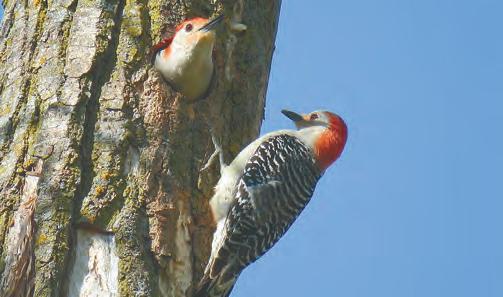




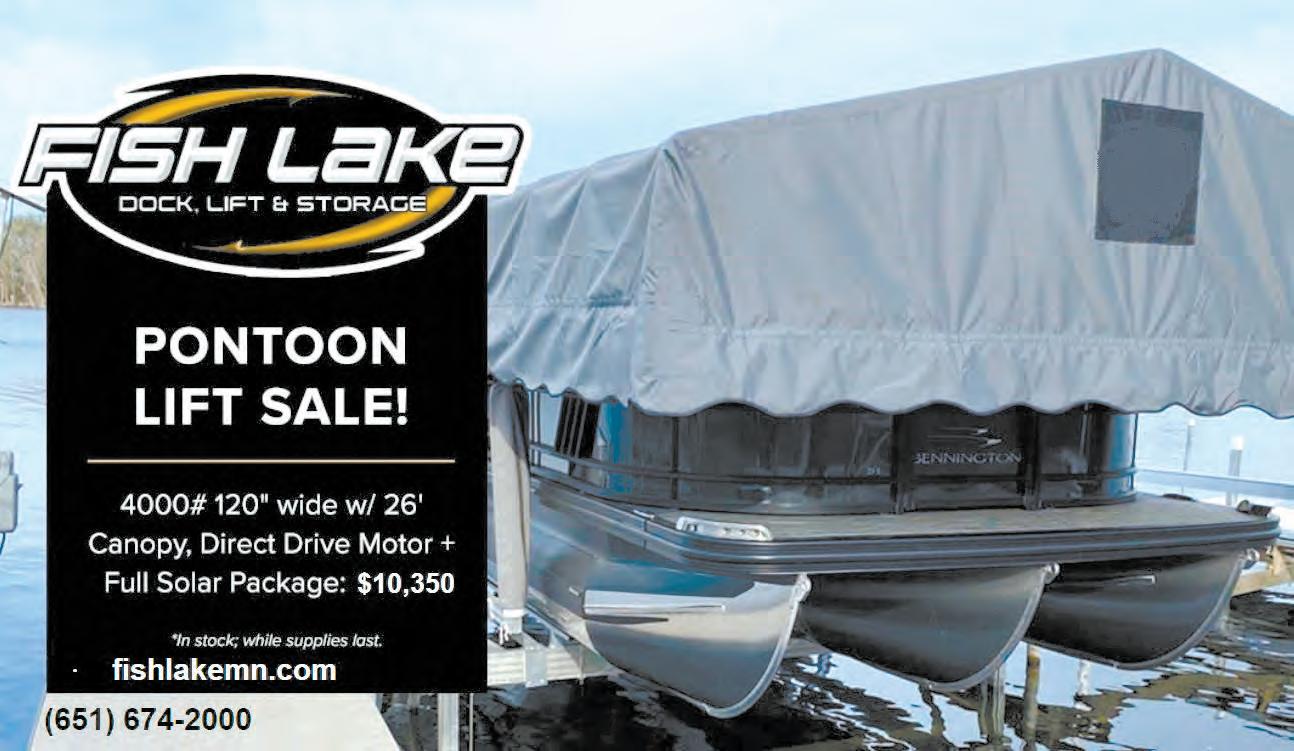
My name is Brian Roelofs and I have been assisting families and businesses just like yours for over 24 years in finding the right insurance company to fit your specific needs. Our agency represents over 50 insurance companies that we can shop to find the best fit for you. As the insurance industry experiences historic increases across the marketplace. Our selection of companies to shop and offer our clients has never been more valuable.
Here are just a handful of some of the companies we represent and can be your agent and advocate with.
AAA - ACE - Acuity - All State - Berkley One - CincinnatiChubb - Encompass - Foremost - The Hartford - IntegrityKemper - Main Street - MetLife - Midwest Family - Nationwide - Progressive - PURE - QBE - Safeco - Secura - Selective - State Auto - Travelers - West Bend - Western National - Westfield
If you are looking for a second option for your insurance needs. Please give us a call today!
(Office in Downtown Mahtomedi) 86 Mahtomedi Ave - Mahtomedi www.roelofsagency.com brian@roelofsagency.com

Providing and servicing insurance products for you, your family, and your business that I would want for myself,


Z320RZTrak™ Mower with 42-in. Deck
• Mow up to 2 acres
• 21.5 HP* (16 kW) V-Twin engine
• 42-in. (107 cm) Accel Deep™ Mower Deck
• 20-inch (50.8 cm) high-back custom-tailored seat with arm rests
• 3-year/200-hour bumper-to-bumper warranty**
3 • No. 1
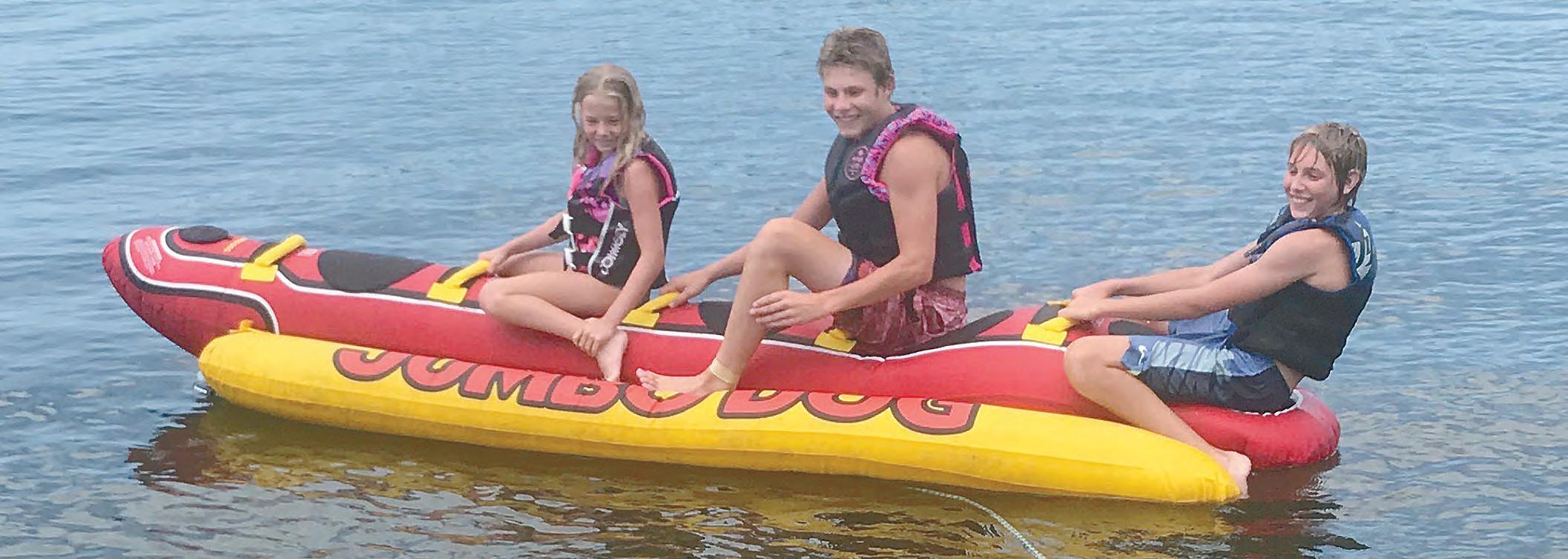
by Erik Suchy Staff Writer
The next time you see not one but two inflatable hot dogs crawling with kids on Bald Eagle Lake, you’ll know who to thank.
One of them is Patty Hall, who, when not helping organize events and programs with H20 For Life (of which she is a co-founder), enjoys watching her nephews and grandkids have fun on the distinctive craft. “Every time we go out with it, it’s fun,” said Hall. “It’s one of those vehicles that you can put multiple ages on. They can be rough on it, fall in the water and have fun. It’s just been a great investment.”
Hall has owned multiple iterations of the hot dog since 2016. Initially buying a three-seated version, Hall has since upgraded to one for five people to accommodate kids and teenagers. “If you have younger kids, you can squeeze six on, but with teenagers, five is tight, and they’re hanging off of it, dragging and carrying on,” said Hall. Hall says an advantage of operating the

hot dog is its smaller size compared to wider tubes, the former of which allows for greater mobility when out boating with her grandchildren. “Wider tubes are not much fun for the kids behind a pontoon because ours is about 65 to 75 horsepower,” explained Hall. “It doesn’t make a big wave for them to go back and forth. The hot dog is more stable for them to get up and started with, and you don’t have to go as fast. The fun of it is that
they’re all trying to stand on and do tricks on it, and they are all falling in the water.”
Nancy Krocak, who lives near Hall, is the other proud owner of an inflatable hot dog, citing the latter as an inspiration to buy her own. “Truth is, Patty loaned me hers one day,” said Krocak. “It was so much fun, and it was safe for the little kids.”
Krocak bought her hot dog a few years later at Joe’s Sporting Goods, bringing
it out onto Bald Eagle Lake for her grandchildren and occasional neighbors to enjoy. Much like Hall, Krocak said that the greatest joy they get from the hot dog is utilizing it as a floating dock versus a pull-tube. “Sometimes, they leave it in the yard and let the kids use it as a trampoline,” said Krocak.
Krocak has owned the same hot dog (which also seats a maximum of five people) since purchase, albeit admitting that it is starting to show signs of wear and tear. Despite this, she said that careful steps are taken to ensure it stays protected. “We put it away when we're done with it,” said Krocak. “We don't keep it set out in the sun.”
While both hot dogs have enjoyed their share of popularity around the lake, Krocak said she sees no reason to take hers anywhere outside the area. “It’s so convenient,” said Krocak. “We say, ‘Let’s go on the boat,’ and within five minutes, you can be on the lake. It’s also not super busy.”
When asked if she thinks everyone should own their own inflatable hot dog, Krocak responded: “Well, it wouldn’t be bad. But I don’t mind loaning mine out!” ◼
Here are tips to safely enjoy the sailboat race season on the water:
1. Keep your distance of the race course, starting line, committee boat, offset buoys, finish and avoid being upwind of racers.
2. Be aware of your wake. As a power boat, your wake can affect the sailing fleet and even swamp a boat, putting sailors in danger.
3. Be supportive of the racers and encourage good sportsmanship among spectators.
4. Sailboats have the right-of-way.
5. As a spectator, always be ready to move and keep your motor running.
Whether you're sailing or power-boating everyone is here to have fun. ◼




Photos contributed
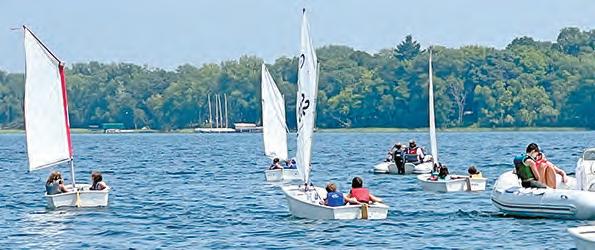
Spectators aboard pontoons can be taken off guard with the speed of these race boats. The A Scows is the largest of the sailing fleet measuring in at 38 feet in length and a beam of 8 feet. It has 6 + crew members. The flat wide hull maximizes waterline length that can increase speed. The A Scow has been known to hit speeds of more than 35mph.

The most popular design of Hobie cat is the Hobie 16. This 16 foot twin hull design was built for two and was introduced in 1971. These boats are known to reach speeds of more than 25 mph.

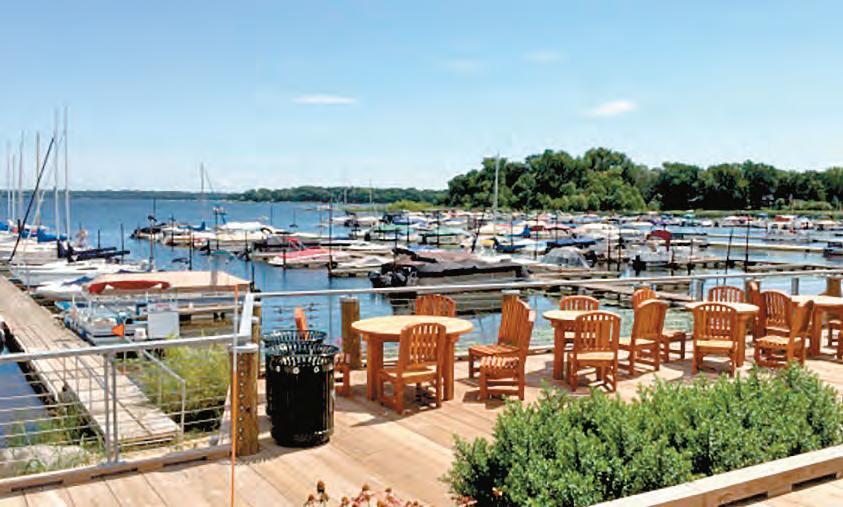

by Erik Suchy Staff Writer
Each year, the Minnesota Department of Natural Resources (DNR) stocks fish in White Bear Lake. East Metro Fisheries is primarily in charge of stocking the lake and 90 lakes and miles of streams and rivers. So, how many different fish are stocked in the lake each year?
Fertilized walleye eggs originate from Pike River on Lake Vermilion but are transported to the St. Paul Hatchery. Here, these eggs take roughly two to three weeks to hatch into fry and are then brought to rearing pounds to grow into fingerlings fully. Usually, it can take until fall for fingerlings to grow to their full size.
Fertilized muskie eggs, on the other hand, originate from Lake Rebecca in Hennepin County. The lake itself is stocked from a brood-strain of muskies in Leech Lake. Like fingerlings, muskie eggs are brought to the St. Paul Hatchery to grow into fry. They are also brought to rearing ponds to grow to fingerling size by autumn. Most muskie survival rates depend on differing factors including summer weather fluctuations and pond stocking densities, among others.
However, it should be noted that releasing fall fingerlings is not a surefire guarantee that fishermen may catch larger-sized fish later on. Most fish managers from the DNR estimate that roughly 4 to 5% of annual statewide walleye catch is from stocked fish. The rest of those caught generally come from natural reproduction.
The cost of walleye stockings is, on average, $3 million per year. Most of this is paid for through DNR’s stocking program license sales. “That’s what pays our more or less $35 million annual fish operations budget,” said TJ DeBates, East Metro Area Fisheries supervisor. “The one thing in Minnesota is we have pretty consistent license sales. Even though our fisheries operations are based off of just license sales, we are looking at other avenues for funding some of the work we do.”
Anglers who purchase walleye stamps, though not required for walleye fishing, go towards covering privately purchased fish for extra stocking. Proceeds from trout stamp sales cover stocking trout throughout the state, as trout are not stocked in White Bear Lake.

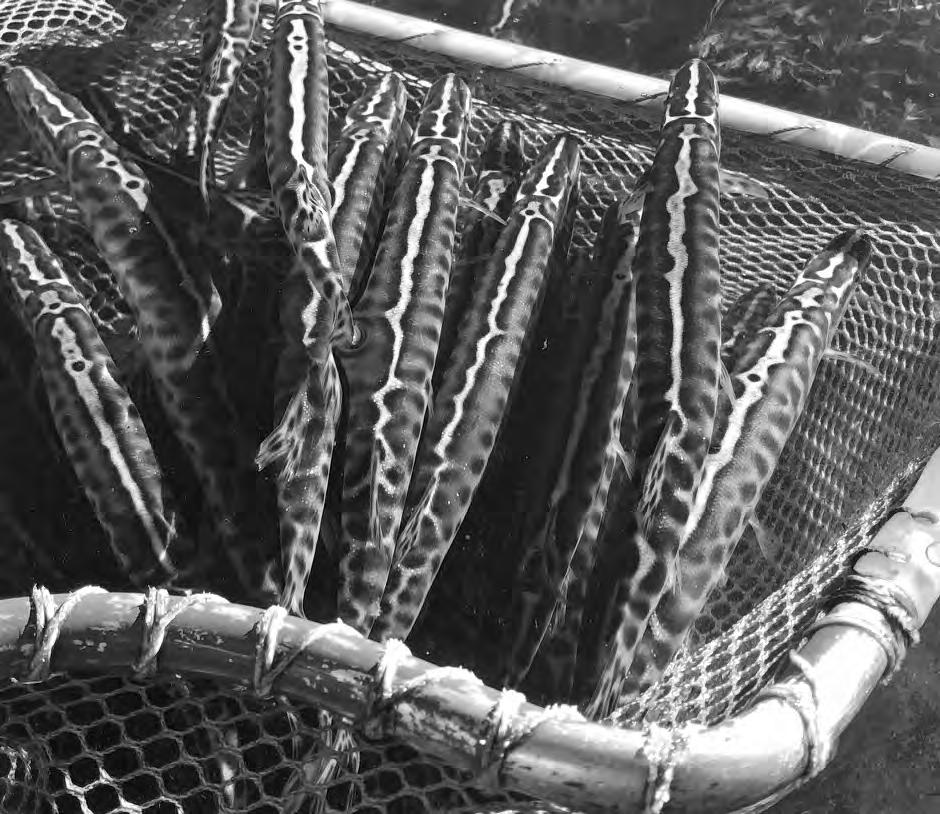
“Floy” tags can usually be spotted on some stocked muskies around White Bear Lake. These are typically located near the dorsal fin, are colored yellow and are roughly an inch long. Anglers who catch one such tagged fish should record the tag number, fish size and date, which should then be entered online at https://webapps.dnr.state. mn.us/tagged_fish_reporting.
According to Jim Levitt, East Metro Area Fisheries assistant area supervisor, the DNR follows up with anglers regarding tag information. This includes a history of the fish caught, its size and when the DNR put it in the lake. According to Levitt, the information helps the DNR look into the survival of stocked fish and which fish are surviving better.
2024
The St. Paul Hatchery was established in 1877, beginning as a holding/shipping station under the name “Willow Brook Hatchery.” While it originally had seven spring-fed cold water ponds, the hatchery currently has two in production. ◼
By Lynn Nelson Special to The Laker
My great-great-grandfather Caspar Bloom served in the Civil War twice before settling in White Bear Lake. His is the cautionary tale of most immigrants. Caspar left his homeland of Canton Glarus in Switzerland because the land available to his family could not feed their growing brood, and the beleaguered country offered financial incentives to leave.
Born in 1838, Caspar came to America at age 10 in 1847 with his parents and 16 other Swiss families. Their ship, stopped by lack of wind for 30 days, causing them to run short of food and water, took 96 days to sail from Bilten, Switzerland, to New Glarus, Wisconsin, (about 30 miles southwest of Madison).
The Washington Township, Green County, Wisconsin, census of 1860 shows that Caspar’s parents and siblings were making a fair living collectively farming about 340 acres.
In the fall of 1861, Caspar enlisted in the Union Army for three years as a member of the 9th Wisconsin Infantry Volunteers. Unfortunately, he was discharged with pneumonia a year later, and returned to the farm near New Glarus for another year.
All soldiers of the 9th regiment were required to speak fluent German, and Casper was from the Swiss/German part of Switzerland. It should be noted that the 9th Infantry, according to my mother, Barbara Chapman Nelson’s research, was reinforced by two Indian Infantry regiments, who unlikely spoke German, but who were invaluable to the 9th Wisconsin as they encountered “predatory bands” while moving from
Camp Sigel in Milwaukee to Fort Gibson in Oklahoma.
In the fall of 1863, Caspar reenlisted as a member of the 1st Regiment of the Wisconsin Heavy Artillery division, which was ordered to New Orleans to contain Confederate forces on their southwestern flank. By December 1864, Caspar was hospitalized again, this time with yellow fever and was given a disability discharge in the spring of 1865. He again returned to Wisconsin to farm.
In 1869, at age 31, Caspar married 17-year-old “Maggie” Elmer, whose family emigrated to America with the Blooms, and they had two sons. It is unclear how, but his brothers’ store in New Glarus burned in the fall of 1872, and the following spring the entire extended family headed by covered wagon for Nobles County in Minnesota. Civil War veterans were promised 160 acres to homestead there. The place where they settled is now called Bloom Township (after Caspar’s father) in the southwest corner of Minnesota.
Sadly, in the summer of 1874, grasshoppers (known as the scourge of the prairie) devoured all their crops, except potatoes. They had been farming for more than two years, living in sod houses, and not a crop had been raised.
In the spring of 1876, my greatgrandmother Emma was born, followed a year later by my great- uncle Fred, who was very dear to my Grandmother Ruth’s family and was the mayor of White Bear Lake in the 1940s.
According to the Nobles County website, “from 1873 to 1879, the


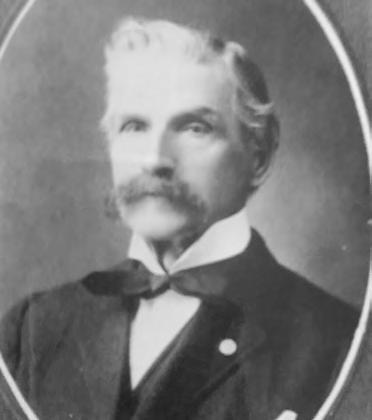
settlers suffered through plagues of grasshoppers and terrible winters. The January 7th to 9th blizzard of 1873 was one of the worst storms that covered the Northwest area. Seventy lives were lost—four in Minnesota.”
Some family members left Bloom Township for Oregon in 1877, and some of the younger Blooms left for White Bear Lake, followed by many others in the early 1880s.
Limited state and federal assistance could not sustain the new Minnesotans, and in 1882, Caspar lost his farm in Nobles County, due to the inability to pay the mortgage and taxes.
And his wife Maggie became severely depressed – possibly after losing one of their children - and ended up at the state hospital for mental illness in St. Peter for the rest of her life.
Caspar brought his five surviving children to White Bear Lake, where they were boarded with different families, while Caspar worked as a carpenter.
Despite the hardships he endured

throughout his life, in 1924, he died in White Bear Lake at the ripe old age of 86 and is buried at Union Cemetery. His obituary made the front page of the White Bear Press July 24, 1924. Caspar’s name is inscribed – along with scores of other local Civil War veterans – on the statue welcoming walkers to Clark Avenue at Second Street near Domino’s Pizza across from the library.
Peace to their memories.
Lynn Nelson is a White Bear Lake resident and regular contributor to The Laker. She maintains a blog at www. LakeAvenueWBL.com. ◼

PENDING | $1,250,000
In Discover Crossing, Lake Elmo!
Experience this exceptional one-owner home, nestled on a private, wooded lot in the coveted Discover Crossing neighborhood, offering panoramic wooded views overlooking a tranquil pond. This two-story walkout residence blends everyday comfort with sophisticated design, perfect for both everyday living and entertaining. Convenient neighborhood offers walking trails and easy access to Stillwater, Woodbury, and the twin cities.

SOLD | $2,500,000
On the St. Croix River!
Escape to this rare riverside sanctuary on the St. Croix, where tranquility, privacy, and upscale luxury come together in perfect harmony. Set on 2 acres with 400 feet of sandy shoreline, this home offers "a tranquil escape with a private sandy beach, where you can watch breathtaking sunsets, surrounded by lush nature, vibrant wildlife, and the soothing sounds of nearby spring waterfalls- all with the small town life with big city access.

FOR SALE | $1,095,000
On a 5-acre river bluff setting in Stillwater!
Embrace the beauty of every season in this classic Cape Cod walkout home. You'll love being near several walking and biking trails, golf courses, all while enjoying the vibrant dining, boating, shopping, and entertainment options just a mile away in downtown Stillwater. Inside, discover thoughtfully curated spaces bathed in natural light, thanks to expansive windows that create a seamless connection to the enchanting outdoors along with a unique floorplan complete with primary suite featuring two bathrooms and closets!

SOLD | $591,400
Newer built home in Stillwater!
Tucked away in the desirable North Hill neighborhood of Stillwater, this inviting home offers the perfect blend of modern convenience and classic charm. Located just moments from the Stillwater Country Club and downtown, you’ll have easy access to dining, shopping, and entertainment. Built in 2006, this home beautifully complements the area’s historic architecture, while offering the advantages of newer construction, including a poured concrete foundation, a full basement with room for expansion, and a spacious 2-car attached garage.







FOR SALE | $995,000
With views of Turtle Lake!
Discover the perfect blend of elegance and comfort in this stately brick rambler, nestled on a beautifully landscaped lot that offers both privacy and the charm of a neighborhood setting. Garage enthusiasts-this is a rare opportunity! Featuring an attached heated 3-car garage PLUS a detached heated shop/2-car garage with 10-foot ceilings and storage room upstairs. Inside, you'll find thoughtfully updated spaces with newer kitchen, dining room and two main level bedroom suites!

SOLD | $450,000
On the Oak Glen Golf Course!
Discover this beautifully updated townhome nestled on the Oak Glen Golf Course in Stillwater. Enjoy breathtaking sunrises from your deck while being just minutes away from downtown Stillwater and Browns Creek Trail leading to connect up with the Gateway and St. Croix River Crossing Loop Trail. This versatile end unit features a refreshed interior, an oversized 2 car attached garage (for the golf cart?), a walkout lower level and low maintenance with snow/mow included in HOA.




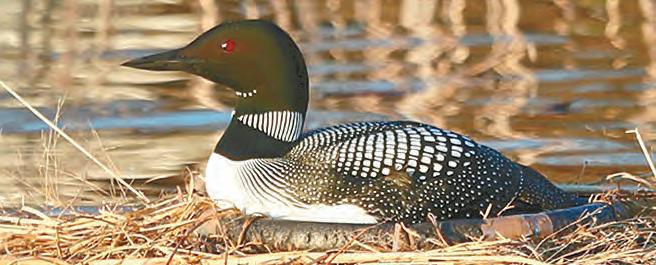






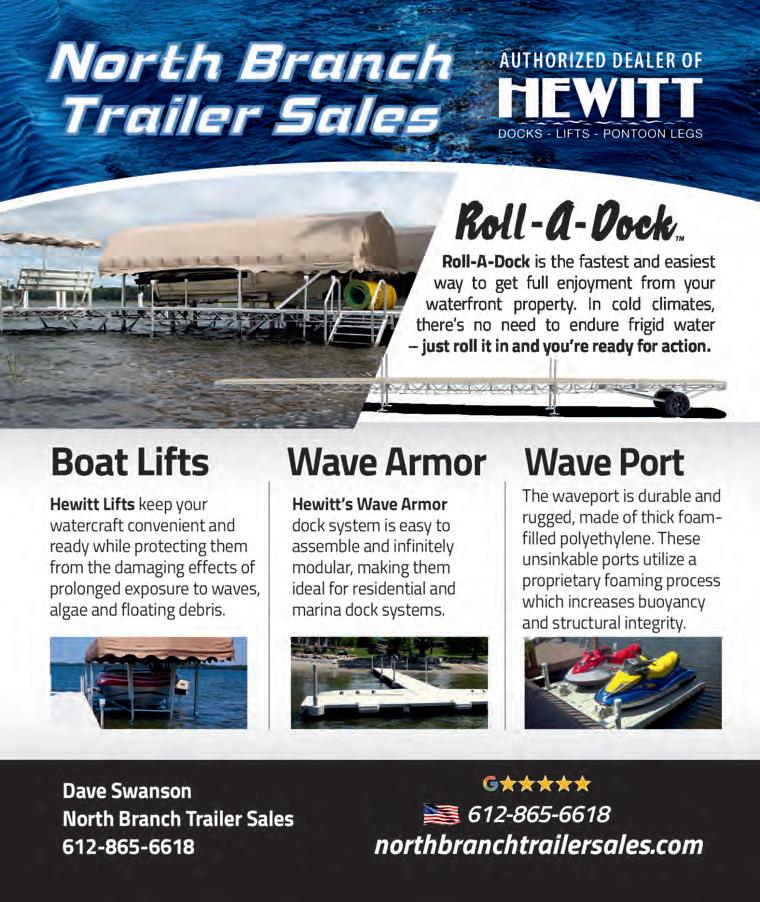









by Erik Suchy Staff Writer
If you were to give Joel Lemanski a boat of historical significance, odds are he would find something pretty cool to do with it. In anticipation of the 2025 White Bear Lake Boat Show, that will come in the form of a 1928 Chris-Craft Cadet.
Lemanski admits that his passion for restoring old boats is about understanding history and the art of restoration. “The history behind them is phenomenal,” said Lemanski of the Cadet. “The people that built those boats were craftsmen. They knew what they were doing, and to replicate all that stuff kind of puts you back in that era. This thing was floating 98 years ago; it’s floating today, and it looks just like it did.”
Lemanski, who restores boats out of a pole barn in Grant, initially obtained the Cadet from a customer to restore for last year’s boat show. Due to the length of the process, Lemanski was unable to submit it on time; this year, he says it will hopefully be ready
for display. “It’ll be cool to go back and look at the pictures of this skeleton of a bow, and then see it right in person,” he said.
Although Lemanski seeks to restore the Cadet as close to its original design as possible, some changes are being made. The original Chris-Craft boats were designed using Philippine mahogany. Because it is no longer available, Lemanski is using Meranti, a variety of mahogany, to restore its framing.
The boat’s underside is being redesigned with a “5200 bottom,” referring to applying a 3M 5200 marine adhesive to a boat hull’s bottom planks. This is to create a more watertight and durable seal.
During the Chris-Crafts’ heyday, most boat shop owners used pumice to remove dust on its varnish. Lemanski will be using the same approach to remain consistent with history. “They didn’t really have very clean shops,” noted Lemanski. “They were pretty dusty, so they just figured, ‘Well, it gives it a sand finish.’ That’s what we’re doing on this boat. It’ll look just like it did when it came off the production floor in 1928.”
According to Lemanski, the hardest piece to reproduce was its steering wheel due to it being hard to find. Despite the changes, the boat’s license plates will not be replaced and will remain in their original form. “They are full of patina, and they are almost 100 years old,” said Lemanski. “We’ll reuse and polish them up a little bit.” The final touch to the boat will be applying varnish, of which 12 to 15 coats are used before it is reassembled.
Original documentation via the Virginia Area Historical Society has allowed Lemanski to uncover even more of the Cadet’s history. “This particular boat actually had a government number on it, which could mean a couple of different things,” explained Lemanski. “It could mean that it was used as a tender for a yacht at the time, or it was used for some government purposes, possibly a tender on a warship. If you’re familiar with any of that stuff, you can document the boat.” ◼

by Erik Suchy Staff Writer
VFW Post 1782 has long been seen as a gathering place for veterans and members of the community along the shores of White Bear Lake. Those who enter the building nowadays, however, may notice some new changes and additions to draw in a broader crowd.
“It wasn’t so much that we wanted to get away from the old VFW and be more of a new VFW,” said House Committee Chair/former Post Commander Mike Lindvall. “We just wanted to be more inviting for everybody.”
According to Lindvall, the newer designs and atmosphere initially began with updating the post’s restrooms and kitchen. “A member of our auxiliary passed away and left us some money. It was decided, ‘What can we do with it?’ We were looking at our club and decided perhaps we should invest in it and make it more inviting.”
In addition to updating the post’s bathrooms to comply with ADA standards, the kitchen has been renovated. More air fryers have been added to the latter due to increased server capacity. “It kind of started off as a place to do a fish fry or spaghetti feed to raise money,” said Lindvall. “Now we’re in a Twin Cities area where their expectations of a restaurant are a lot higher than what a VFW could provide. We wanted to make sure we could get food out in a timely manner and still be of the highest quality that we can do.”
New sound paneling has also been installed in the post’s ceiling, which Post Commander Bob Krominga added was a feature the post had considered long before. “We looked at doing that earlier, but we didn’t know which way we wanted to go with it; we finally came up with a product that worked pretty good.”
The walls opposite the bar area are re-painted blue and white to give it a more nautical theme. “A lot of people have the idea of VFWs being a dingy,
dark place,” said Club Manager Sheila Parato. “There’s also a separation of the bar and dining room now with benches, which are nice for families. They don’t feel like you’re sitting right in the middle of a bar.”
To highlight all current members, both post and auxiliary, a lighted cabinet box with the names magnetized has previously been used. For better accessibility, the post is moving forward with an electronic membership board instead.
The post’s POW/MIA table has also been moved from the back of the dining area toward the front, near the bar. The table serves as a symbolic “seat” for soldiers to sit when they return home and includes various items symbolizing their service. Some featured objects include a single red rose in a vase, representing the families and loved ones of those still serving. A yellow and red ribbon is tied on the vase, reminiscent of the ribbon worn by soldiers. A lit candle sits on the table, symbolizing soldiers reaching upward to achieve the unconquerable. In contrast, the table’s bread plate is sprinkled with salt, representing the tears their family still cries while they wait.
“Remember!” reads the writing placed next to the table. “All of you who served with them and called them comrades, who depended upon their might and aid, and relied upon them, for surely, they have not forsaken you! Remember! Until the day they come home, remember!”
Apart from the re-introduction of fried chicken, the post’s food and drink menu will mostly remain unchanged. Despite this, Parato said that she is always open to new choices being added. “We’re always open for options. We do have a new chef who joined our team, and has a lot of really interesting ideas. He’s making some new different types of soups. I really encourage our kitchen to be creative; if they want to try something, let’s do it.”
“We’re really not monkeying around with our menu,” added Lindvall. “We’ve brought in some salads in the last few years because a lot more people are trying to eat healthier.”


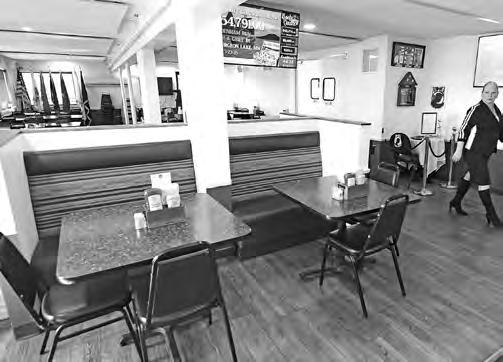
Of these changes and additions, Lindvall hopes for the VFW to draw in combat veteran families in addition to the post’s current crowd. “We want to be more family-friendly because our World War II veterans are not around anymore, unfortunately. A lot of our combat veterans have families. If we can make our events more family-friendly, they’re more apt to bring in their daughter, son and come and hang out. The social norms today are a little different than they were 30 to 40 years ago.” ◼

Ingredients:
4 boneless skinless chicken breasts
1 ⅓ cup soy sauce
½ cup water
½ cup rice vinegar
1 cup sugar
1 teaspoon ground ginger
¼ teaspoon crushed red pepper flakes
2 teaspoons minced garlic
3 tablespoons cornstarch
½ teaspoon sesame seed
Toss chicken breasts in teriyaki sauce and place on top of steamed rice and broccoli. Top with chopped green onions.
Ingredients:
76 Rum (locally owned and supports veterans)
Strawberry puree
Ginger beer
Splash of soda and lemonade
Splash of Rose’s Lime Juice
Shake and serve over ice. Top with lime, mint leaf and strawberry.


